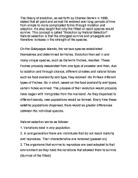Elena Coates
Discuss the role of chance in evolution
For decades the role of chance in evolution has been heavily debated within the scientific community. Creationists have long thought that this very topic is the theories downfall; that life on Earth, with all its beauty, precision and complexity cannot be formed by what appears to be a random process. However, to think that evolution is nothing more than blind chance and randomness is an elementary mistake. Although evolution relies upon mutation which is an entirely random process, natural selection which acts upon these mutations is not random. It does not select alleles by chance but is instead governed by the characteristics of the environment, selecting traits that have an advantageous effect and lead to an increase in fitness of the individual. This process therefore preserves the good variations and eliminates the bad ones.
Random genetic drift is a potent factor in evolutionary change within a population. This is a mechanism that results in fixation (or loss) of alleles by purely random processes, as allele frequency fluctuates between generations due to sampling effects. The smaller the population, then the higher the chance that major changes in gene frequency can occur. If an individual possesses a new beneficial mutation, this mutation can still be lost when it occurs at such a low frequency. A chance event may kill the individual losing the mutation forever. These kinds of events have shaped evolution, showing there is chance involved even after the random mutations have occurred. As random genetic drift and evolution are the two main influences on the ‘change in allele frequency through time’, then it is important to establish how much each part has to play within evolution in order to ascertain the effect of chance on evolution. There are certain factors that can affect the influence these two processes have, such as the population size and the fitness difference between individuals in the population however the debate is still open to interpretation.








